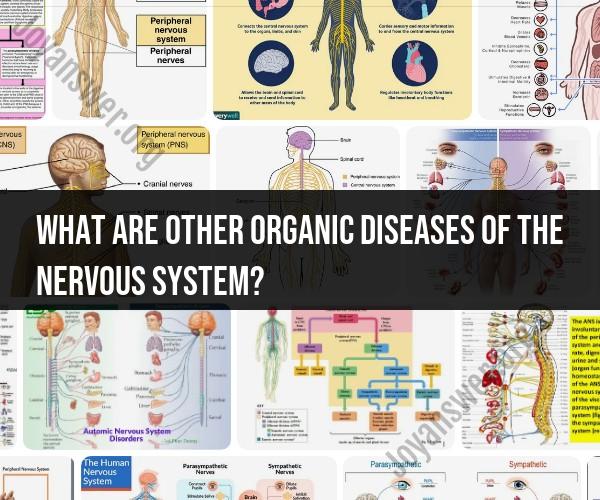What are other organic diseases of the nervous system?
Exploring organic diseases of the nervous system goes beyond the realm of common neurological disorders and delves into a wide range of medical conditions that affect the central and peripheral nervous systems. These diseases are characterized by structural or biochemical abnormalities within the nervous system itself, as opposed to functional disorders that lack identifiable physical causes. Here's an overview:
1. Neurological Disorders: Organic diseases of the nervous system encompass a broad category of neurological disorders, including but not limited to:
- Neurodegenerative Diseases: Such as Alzheimer's disease, Parkinson's disease, and amyotrophic lateral sclerosis (ALS), involve progressive deterioration of nerve cells.
- Autoimmune Disorders: Such as multiple sclerosis (MS), where the immune system mistakenly attacks the nervous system.
- Genetic Disorders: Like Huntington's disease, which is caused by mutations in specific genes.
- Infectious Diseases: Such as meningitis, encephalitis, or neurosyphilis, result from infections affecting the nervous system.
2. Neuromuscular Diseases: Conditions like muscular dystrophy and myasthenia gravis primarily affect the neuromuscular junction, where nerves communicate with muscles.
3. Brain and Spinal Cord Tumors: These are abnormal growths within the central nervous system, which can be benign or malignant.
4. Vascular Disorders: Strokes, aneurysms, and vascular malformations can disrupt blood flow to the brain and spinal cord, leading to neurological symptoms.
5. Traumatic Brain and Spinal Cord Injuries: Physical trauma to the head or spine can result in organic damage to nerve tissue.
6. Metabolic Disorders: Conditions like Wilson's disease, phenylketonuria (PKU), and mitochondrial diseases can affect the nervous system due to metabolic abnormalities.
7. Toxic and Environmental Factors: Exposure to toxins, such as heavy metals or certain chemicals, can lead to organic damage to the nervous system.
8. Nutritional Deficiencies: Inadequate intake of essential nutrients, such as vitamin B12 or thiamine, can result in neurological problems.
9. Paraneoplastic Syndromes: These rare disorders are associated with cancer and can affect the nervous system due to an immune response triggered by the tumor.
10. Rare Genetic Disorders: Conditions like Rett syndrome, Krabbe disease, and Niemann-Pick disease involve genetic mutations that affect nervous system development and function.
11. Degenerative Conditions: Some organic diseases involve the degeneration of specific nervous system structures, like the cerebellum in spinocerebellar ataxias.
12. Neurological Complications of Systemic Diseases: Diseases like diabetes, lupus, or HIV/AIDS can lead to neurological complications.
Exploring organic diseases of the nervous system involves understanding the underlying pathology, clinical manifestations, diagnostic approaches, and treatment options for each specific condition. It often requires collaboration between neurologists, neurosurgeons, radiologists, and other medical specialists to provide comprehensive care to patients with these diseases. Early diagnosis and appropriate management are crucial for improving the quality of life for individuals affected by these conditions.












